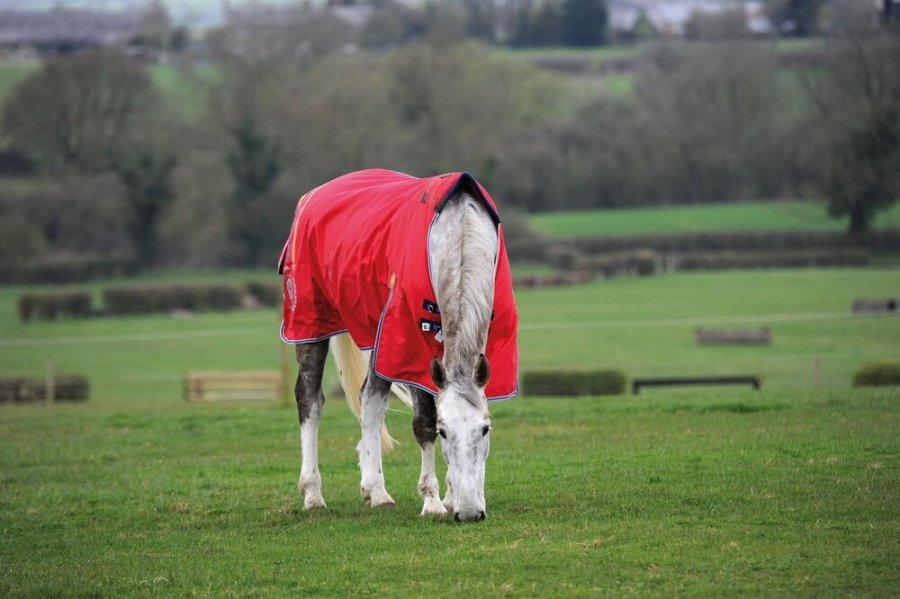A horse’s digestive system is a complicated place and it can be worrisome, expensive and emotionally draining for horse owners when things go wrong. The good news is that there’s plenty you can do to help keep a horse’s digestive system functioning smoothly, and the horse’s diet is at the centre of achieving this.
“Horses have a gastrointestinal system that has evolved and adapted for constant movement and near constant trickle grazing,” explains vet Sara Fleck from Bishopton Equine Vets, an XLEquine member practice. “Our use of horses as working animals has resulted in a change of management that limits both of these. Attempting to mimic natural feeding and movement patterns is the key to keeping the digestive system functioning well.”
Horses with access to ample pasture will spend up to 18 hours a day grazing, while slowly moving around the paddock, which helps to stimulate gastrointestinal motility. So, where possible, regular turnout is the ideal way to ensure good digestive health in horses.
Other management routines to utilise in order to keep your horse’s digestive system moving include:
- Regular dental care to aid chewing.
- Feeding food damp and cutting fruit and vegetables into small pieces to avoid choke.
- Introducing any changes in management or diet gradually, to give the microbial population in the system time to adapt.
- Feeding small, regular meals, alongside high-quality forage.
- Controlling parasites (worms) by good pasture management, faecal worm egg counts and targeted use of appropriate wormers.
- If your horse is turned out on sandy soil, consider feeding psyllium as a supplement to prevent sand colic.
Feeding for good gut health
The horse’s hindgut is where fibre is fermented by microbes to produce energy. It’s important to keep the hindgut healthy, as well as the balance of beneficial and harmful microbes that reside there, as an unhealthy gut can cause problems in the gastro-intestinal tract. Olivia Colton, senior nutritionist at Feedback, advises the following to keep the hindgut healthy:
- Keep your horse hydrated — Dehydration increases the risk of hindgut issues, including impaction. If a horse is reluctant to drink, try giving a soaked feed, adding water to bucket feeds and soaking hay. Offering warm water can also encourage drinking.
- Provide plenty of forage — Where possible, provide your horse with ad-lib forage. If this isn’t an option, ensure forage is fed regularly. Too little forage increases the risk of colic, gastric ulcers, and other digestive problems.
- Keep high-starch feeds small — If you feed too much starch in one go, it gets pushed too quickly though the small intestine (where starch should be digested), and so enters the hindgut undigested. It’s then rapidly fermented, producing lactic acid and lowering the pH of the hindgut, which inhibits the population of fibre-fermenting microbes.
- Add oil for additional energy or condition — When added to the diet gradually, these are much kinder on the gut than high-carb diets.
- Make any changes to the diet gradually — Abrupt changes can upset the delicate balance of microorganisms in the hindgut.
- Avoid overusing oral antibiotics and wormers — Though necessary, prolonged use of antibiotics and wormers can harm the population of beneficial microbes within the hindgut. Resistance to these drugs is also a very real threat to the horse population around the world.
- Try prebiotics and probiotics — If your horse is prone to gut disturbances, or you’ve recently administered antibiotics or wormers, feeding a good quality prebiotic and probiotic supplement daily will help to promote the growth of good bacteria in the hind gut, and promote overall digestive health.
When digestion goes wrong
Loose stools: The most common cause of diarrhoea is a change in diet that affects the water content in faeces, or disrupts/ changes the microbial population within the gastrointestinal system. Other causes may be a parasitic, bacterial or viral infection, a response to drug use, tumours or malfunction of other internal organs.
Choke: Narrow rubes are always prone to getting blocked, and when a blockage of the oesophagus occurs, this is described as choke. It differs to choke in humans, which generally refers to a blockage of the trachea or windpipe. In horses, most episodes of choke will clear on their own, but in some instances, veterinary intervention may be required.
Ulcers: The risk of gastric ulcers forming is increased by long periods of time spent with an empty stomach. A food ‘mat’ within the stomach helps prevent acid splashing and damaging the upper, unprotected squamous stomach lining. Diagnosis is usually by gastroscopy – feeding a long flexible endoscope (camera) down the horse’s oesophagus and into the stomach so the lining can be examined.
Colic: Colic is abdominal pain and may originate from any of the abdominal organs. However, the complex anatomy of the gastrointestinal tract means it’s involved in the vast majority of cases. Colic is broadly categorised into the following:
1. Idiopathic/ spasmodic colic
Also known as gassy colic, this is the most common type and occurs when the intestine contracts abnormally, creating painful spasms. Idiopathic is a veterinary term for ‘unknown origin’ as, despite investigation, there are still episodes of colic where the cause is never determined. Thankfully, the majority of these respond to simple medical treatment.
2. Impactions
This is when a part of the gastrointestinal system is blocked by food material. Impaction colic is fairly common and may resolve with administration of fluids via a stomach tube. Occasionally, larger and more severe impactions will need surgery. Changes in the way a horse is managed is often the cause of impaction colic.
3. Displacements, strangulations and torsions
Displacements happen when one section of the small or large intestine moves to an abnormal location within the abdomen. Strangulating colic describes an episode where the blood supply to a piece of gastrointestinal tract gets cut off. Torsions occur when the bowel twists on itself, cutting off the blood supply. Some displacements can be treated medically but severe ones, and all strangulations and torsions, require surgical correction.
Spotting signs of trouble
Knowing your horse’s normal behaviour is the best way to identify any abnormalities with their digestive system. Seek veterinary advice if you spot any of the following:
- Quidding (dropping partially chewed food from the mouth while eating).
- Coughing or retching after feeding, excessive salivation and food coming from the nose or mouth may indicate your horse is trying to dislodge food during an episode of choke.
- Changes in behaviour, grumpiness when being girthed, weight loss or poor performance – any of these could be indications of ulcers forming.
- Changes in your horse’s manure, as this may reveal information about hydration, efficiency of digestion or parasitic burden.
- Flank watching, rolling, box walking, lack of appetite, vocalising, looking dull/ quiet, diarrhoea, or a lack of faeces are strong indications of colic.










